
by Christina Waters | Oct 3, 2018 | Home |
Living large isn’t really a choice in Manhattan—it’s the law! Especially where food is concerned. From the reliable Pain Quotidien to the Michelin-starred Modern—with bagels, macchiati, gelato, and a few memorable cocktails in between—we sampled with gusto last week in NYC.

Here is a mouth-watering panino—marinated artichoke hearts, fontina and ham—I swilled daintily at the super posh Sant Ambroeus Ristorante at 1000 Madison Avenue. Here the women really do wear Prada and the men all speak Italian. I finished off this inexpensive lunch ($13) with a macchiato and chocolate gelato. That fueled my walk all the way back to Times Square.
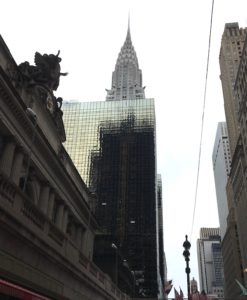
Duty-bound, we located the ultimate New York bagel at Ess-a-Bagel on Lexington Avenue. We joined the queue that snaked outside the door for a half hour and finally scored bagels the size of Canaan. Slathered with lox, tomatoes, cream cheese, and onions, these were the motherlode of chewy, dense, delicious. Thank you Matthew for your fieldwork!
The night we flew in, we had a terrific meal at Daniel Boulud’s Bistro Moderne, which I’d booked because it was two blocks from our hotel overlooking the non-stop action of Times Square. Lovely wines, a plump lobster roll with killer french fries for my companion Melo, and fresh wild striped bass on a hash of leeks and peppers for me. Yes, it was a good idea to have a table booked at the end of a day of travel.
The next night was Hamilton, but first a light pre-theater dinner of salmon and pasta at the charming Osteria al Doge (above), another savvy choice a few blocks from the theater.

Our mega-meal happened next—a four course prix fixe at the Modern’s dining room, an elegant but unpretentious tasting tour through one of the better kitchens in Manhattan. Every bite, every sip, lived up to our expectations.
An amuse of fresh tomatos three ways, was joined by the first of several breads and this charming ring of herb-embedded butter (image above). Indulgence in every way (and if you get that pun, you get extra credit).

My first course was a lovely orchestration of seared prawns with toasted pistachios. Next two luscious pieces of lobster with shelling beans in fennel sauce. Duck breast with baby chanterelles (shown here) arrived with the sweet tangy surprise of glazed cherries (all the while I’m enjoying a 2016 Sicilian Nerello Mascalese loaded with the magic of volcanic terroir, but I switched to a pricey-but-worth-it 2015 Domaine Rollin Burgundy toward the end). Dessert, shown here, was as diversely delicious as it looks.
 Strawberry bavarian cream, with small ornaments of sorrel cream and nasturtium ice cream. Note the very tiny nasturtium leaf decoration. Oh God. No course was too large, or too small. Every portion was worth eating, and worth having splurged for.
Strawberry bavarian cream, with small ornaments of sorrel cream and nasturtium ice cream. Note the very tiny nasturtium leaf decoration. Oh God. No course was too large, or too small. Every portion was worth eating, and worth having splurged for.
The next night was our other Broadway date, The Band’s Visit, after which we made a pilgrimage to the Algonquin Hotel, and toasted one of our favorite writers with a drink named after her—the Dorothy Parker, a bracing cocktail of gin, lemon, St. Germain served in a cocktail flute. With it we inhaled a wonderful slab of wood-fired flatbread covered with prosciutto and arugula.
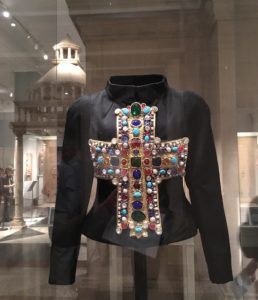
I spent the last day in NYC on my own, wandering through the electrifying Catholic Imagination show at the Met, checking out the Louboutin boutique, and ending up having a light supper at the Modern’s Bar Room, an inviting and vigorous place to enjoy brilliant food, fine libations, and meet unusual, avant-garde, and quite frequently entrepreneurial movers and shakers. I’ve eaten here many times—prices are a fraction of those in the more formal Dining Room.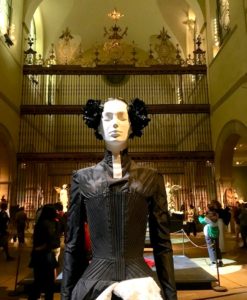
I loved every bite of a basil spaghetti, topped with soft, melting,burrata and toasted pine nuts, paired with a mourvedre/grenache blend.
I love New York, and this visit—with a great traveling companion and the prior decision to cast economic caution to the winds—was the best ever. From the stellar Broadway shows to the gorgeous architecture to the eccentric, beautiful, and well-dressed natives, it lived up to all my expectations. Next time I would skip the overrated Highline (yes, it is nice to see all the new sky-rises at the Docks, but…) and avoid the overly pricey tea at the Plaza (not as wonderful as any in London).
New York is a great city. Don’t leave this planet without a visit.
[more videos and images at my Instagram page]
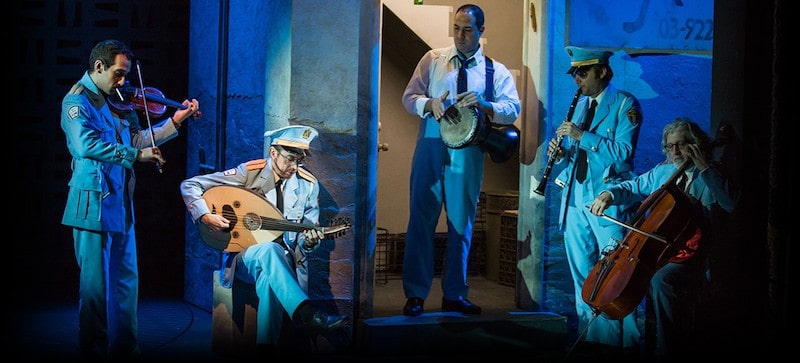
The Band’s Visit
by Christina Waters | Oct 2, 2018 | Home |
As distinct as night and day are the electrifying Hamilton, and the bittersweet The Band’s Visit. Both deservedly showered with Tony awards, and utterly compelling in utterly different ways.
How could the sweet, short, and succinct tale of a hapless Egyptian band, stuck in the middle of Israeli nowhere for a single night, stand up to the fresh memory of Hamilton? After seeing Lin-Manuel Miranda’s towering hip-hop opera I wondered how anything could survive comparison. Especially given the close proximity of each experience, with only one night’s break in between seeing the two shows.
And I still can’t figure out how it was possible. But it was.
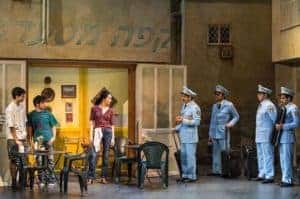
In the magic realist tale turned stage musical by David Yazbek and Itamar Moses, a band of musicians from Alexandria Egypt, outfitted in powder blue uniforms intended to imply dignity, find themselves in a one-horse town called Bet Hatikva (the name itself triggers endless sarcasm and humor). The last bus to where they’re going, a place called Petah Tikvah (yes, it does sound very close to “Bet Hatikva”) has just left. And a small group of bored cafe denizens—including the cafe’s spitfire owner Lina—find themselves reluctantly forced to extend what rough hospitality they can manage. It’s just one night, after all. And the desert casts a spell.
The vignettes that follow, in which we meet a young couple already fighting over lack of money; the town’s unhappy young bachelor; a love-sick young man who stands in front of the single telephone booth waiting for his beloved to call; Dina herself, and her divorced husband; the young couple’s father-in-law and his unquenchable passion for life. Each small story within the village’s dusty little world has its moment in the spotlight. In between, various members of the band create interludes performing mesmerizing Egyptian jazz, klesmer, folk ragas all rolled into one electrifying genre. The music is the soothing and irresistible tie that will bind all these people, Israelis and Egyptians, together for a night that will last for the rest of their lives.
At the center of all these small, vibrant interactions, is the edgy repartée between Dina (Katrina Lenk), with her dreams and cynicism, and the band’s leader, Tawfiq (Tony Shalhoub), a sad man riddled with rich life experience.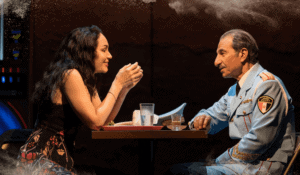 Over dinner, they talk about the movies and movie stars they loved when they were young, romances lost, dreams destroyed.
Over dinner, they talk about the movies and movie stars they loved when they were young, romances lost, dreams destroyed.
And we dance with them on a jasmine scented wind,
From the west, from the south
Honey in my ears
Spice in my mouth.
Dark and thrilling,
Strange and sweet
Cleopatra and the handsome thief
And they floated in on a jasmine wind
And here’s where The Band’s Visit casts its spell. At first, it seems a rather modest, nicely-played series of scenes, each one crowned by some sweet song. The show is small, intimate, and deceptive. But somewhere in the middle it blossoms into a full dimension of enchantment. Poignant and hilarious—many tears, many tears—the show offers a portal into something as simple, and huge as what it is to be human, to have longings, and to find a reason to press on. Daring to open her much-bruised heart, Dina sings, “Something Different” —the powerful center of the show.
For a few hours, in the middle of a monotoned nowhere, the stories Dina and Tawfiq have shared have created something new. Certainly it is a kind of love at first sight, and yet it’s bigger than that.
And I don’t know what I feel
And I don’t know what I know
All I know is I feel something different
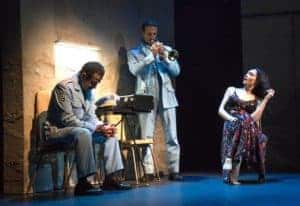
We all know what that is, that elusive yet priceless feeling. Especially when all hope of feeling anything has gone.
The show is short – 1 1/2 hours. Every moment is both ancient and modern. And the music! After the stage goes dark. The lights come up again, and the band sits down—all dozen of them—and plays music like I’ve only heard once in my life: under a full moon on the banks of the Nile.
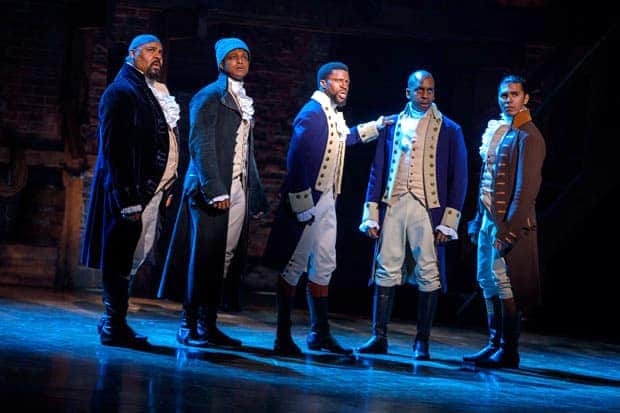
Hamilton on Broadway
by Christina Waters | Sep 25, 2018 | Home |
I went to New York for business, and what I found was pleasure. Exhibitions, food, people, theater, Central Park, bagels, Saks, espresso—everything won me over. And that includes the antics happening on Times Square far below my hotel window on the 40th floor.
Three main events punctuated our evening schedule: Hamilton, dinner at The Modern, and The Band’s Visit. It had been a half dozen years since I took my mom to see The Lion King on Broadway, so I was more than ready for Hamilton.
No. I was not. I was not ready for Hamilton.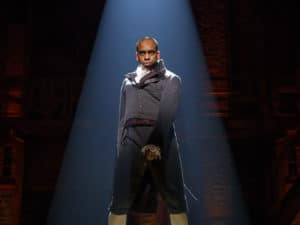
Oh I had been hearing the hype for a couple of years. I remained sceptical. No show could possibly live up to that hype. A show delivered by rap. Give me a break.
But there I was last week, in the graceful old Richard Rogers theater on 46th Street, in an enviable seat with a close and clear view of the entire stage. And then it began.
The United States was about to be dreamed up by a group of youngbloods in satin jackets, ruffled shirts and buckled shoes.
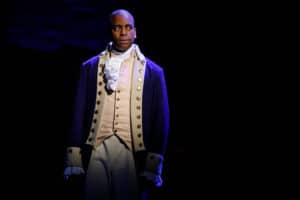 Daniel Breaker as Aaron Burr
Daniel Breaker as Aaron Burr
We, the audience, were collectively spellbound as the latest generation of Lin-Manuel Miranda’s colonial masterminds strutted, pranced, spun, vogued, and devoured the stage. As gorgeous a group of wildly talented men as can be imagined took turns at seducing us, while they plotted ways and means of getting the country up and running.
The revolving stage got a brilliant work-out while each of the founding fathers took turns at making their pitch. The energy alone could have launched a rocket into orbit. And as masterful as is Miranda’s ingenious creation, it thrives on the pyrotechnic energy of its cast, a confident Michael Luwoye as Alexander Hamilton and a scene-stealing Daniel Breaker as Aaron Burr.
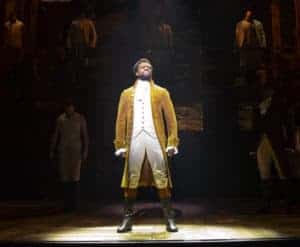
Michael Luwoye as Alexander Hamilton
The pumping fury, the life and death struggles of creating a country, struggles laced with personal agendas, suspicions, political lust, and personal indecisions all explode into edgy musical attitude and full hipster movement in Hamilton.
Which, of course you know if you’ve seen it.
And if you haven’t, I invite you to rob a bank, go without wine for a month, whatever it takes to see this show.
I had seen Cumberbatch as Hamlet in London, but I’d never seen anything like this. Surpassing the hype, as well as my expectations, this was what live musical theater was about. Artistic invention that opens broad pathways of discovery. Physical gestures that ignite the story. On Broadway, somehow, I felt closer to the roots, the epicenter of Miranda’s original inspiration. It was the very theater in which Hamilton was born three years ago.
May it always be sold out.
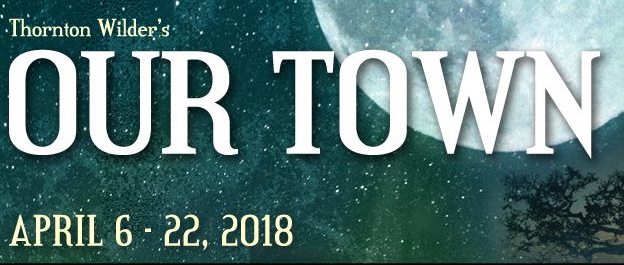
A Timeless “Our Town”
by Christina Waters | Apr 9, 2018 | Art, Home |
American playwright Thornton Wilder won a Pulitzer Prize for his finely-tuned masterpiece, Our Town. First produced in 1938—on a stage completely bare save for some chairs, two tables, and two ladders—it reveals the gritty, glorious, fuzzy reality of what Edmund Husserl called “lived time.” Not the expansive, beginning-middle-end time of fiction or daydreams. But the mundane, emotionally-troubled, worn time of everyday. The lived time that goes by so barely noticed that we, at least those of us over the age of 40, often find ourselves wondering out loud, “where does the time go?”
Thanks to skilled theater professional Suzanne Sturn, the culturati of Santa Cruz have a chance to remember just how true, unflinching, and humbling Our Town remains. Though most of the people in the opening week’s audiences had very likely seen or read the play in their high school years—like good wine, or almost anything by Shakespeare, this play just gets better, and more disturbingly beautiful with time.
Sturn herself plays the loquacious Stage Manager, the person who introduces the audience to the play, the town—Grovers Corners, New Hampshire—and the era, very early 20th century. With pitch perfect and insider wisdom, Sturn’s Stage Manager introduces us to the key residents of the town, the two families who will be joined together upon the marriage of one son George (Maxwell Bjork), and one daughter (Isabel Cruz). With unerring economy—gestures and vocal work do most of the heavy lifting in this production—Sturn moves the residents of Grovers Corners from early morning, to work and school, home again, and then long into the night.
We meet the milkman Howie Newsome (Chris Rich), the town doctor Dr. Gibbs (Dennis Hungridge), Mrs Gibbs (Susan Forrest) who is Emily’s mother, the town newspaper editor Mr. Webb (Bob Colter), and Mrs. Webb (a terrific Gail Borkowski) who is George’s mom. Everything moves smoothly, almost dreamily from the time when the young people are first discovering each other. The middle section of the play, “Love and Marriage,” deepens the awakening of human needs and desires, and introduces a few more delicious players, the town’s hard-drinking choir mistress (played by Mindy Pedlar), and jolly, philosophical Mrs. Soames (Hannah Eckstein).
In their New World Romeo and Juliet roles, courting each other from the tops of ladders, George and Emily unpeel the pain and awkwardness of youth just managing to reach something like agreement about a future together. It is so familiar, so unexpectedly new, so sparingly written, with absolutely not one word too many. Wilder is a humbling precedent for any emerging playwright.
And the final scene, at the town’s cemetery, delivers everything we know is coming. And yet we’re never quite ready for the last scene of Our Town. Sturn’s production utilizes space and time wisely. The players move up and down the aisles of the tiny theater, bringing their hopes, and ours, with them across the thresholds of mortality and whatever might lie beyond.
“Do any human beings ever realize life while they live it?” Emily asks, speaking for everyone who’s ever lived.
If there is anyone who might, against all odds, not know how the play unfolds, I won’t dwell on the final 30 minutes. It’s a surprise worth getting dressed for. But as I watched the play again, struggling for composure, I found myself watching it through my recent reading of George Saunders’ (another Pulitzer Prize winner) Lincoln in the Bardo. Somehow Wilder and Saunders each understood the Buddhist concept of mindfulness, and the need for those of us alive to be released by those we have loved, and lost. The thin, but ultimate membrane that separates life, death, and eternity.
The play itself is better than I could ever have hoped, or remembered. And this production does it justice, making all the right calls in terms of staging and timing. Kudos to the entire cast and director. Thornton Wilder’s Our Town plays at the Center Stage Theater, 1001 Center St., Santa Cruz through April 22. Rife with the magic of an imagined domain that only live theater can realize, this is a production worth two hours and 15 minutes of your time. And then some. Tickets here.
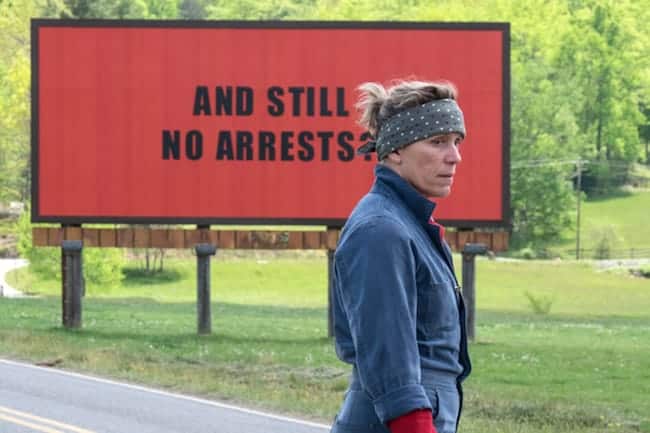
A few words about 3 Billboards
by Christina Waters | Feb 27, 2018 | Home |
Frances McDormand is certainly one of our finest actors. She is incapable of a mediocre or thoughtless performance. And in Three Billboards Outside Ebbing, Missouri she delivers with both barrels, an apt metaphor given the violence of the film.
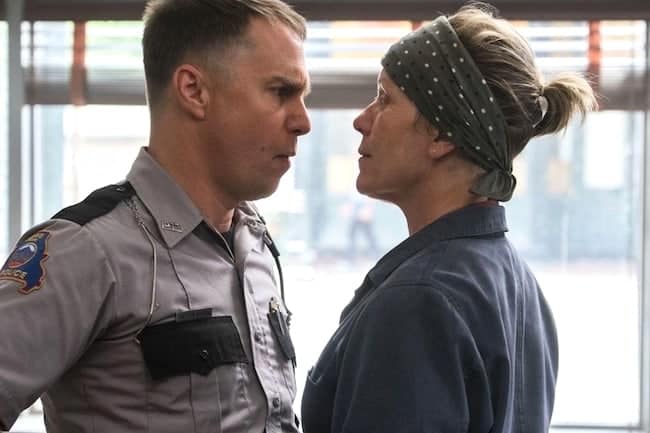
However, she was better in Fargo. She was better in Mississippi Burning. And while she creates an angry working class female hellbent on justice—the distaff equivalent of Charles Bronson’s angry working class male hellbent on justice—I found the character as written and directed by Martin McDonagh, to be a cheap stereotype relying upon expletives to convey depth of rage.
The overload of foul language struck me as way out of line. The point was made early on. We get it. These folks in Ebbing Missouri, from the racist cop Dickson (Sam Rockwell in an Oscar-winning performance) to the loving son of McDormand’s Mildred Hayes (played by Lucas Hedges) all spend a lot of time using the worst words in the Anglo-Saxon vocabulary. The very worst. But is it really necessary for the director to have them using these words in such quantities that we soon realize the F-word, the N-word, and the C-word are standing in for intelligently sculpted scenes of grief, poetic moments of emotion, and soaring diatribes of alienation and outrage?
I was shocked to hear the language a great actor like McDormand was required to spew simply to convince us that finally here was a feminist equivalent to an X-rated Lear.
McDonagh fails to realize this magic realist tale in other ways. It is inexcusably corny. The deer that comes to “visit” the grieving mother at one of the billboards. The scenes with her ex-husband and his new teenage girlfriend. Cinematic Thomas Kinkade. The voice-over we hear from Woody Harrelson’s deceased character, the cop with the heart of gold who dispenses bromides to various characters—redneck deus ex machina. A cheap trick.
Rockwell was pulverizing in a performance that seems to have divided critics and viewers. As the slow-witted, quick-fisted, racist cop who lives with his mom, he is an original creation, one that Rockwell inhabits like a tougher, younger Christian Bale. But there are those who now discredit his Oscar nomination simply because they deplore the character he portrays.
Hey! that’s why it’s called “make-believe.” It’s a movie. A cinematic fable, intended to shine light on the way we live in the real world. Don’t blame the messenger.
And yes, Frances McDormand will probably win the Oscar for her fearless performance.

Pre-Oscar Previews: the Good, the Bad, and the Best
by Christina Waters | Feb 27, 2018 | Home |
 The Good
The Good
I’d have to put Darkest Hour in the “Good” category although in retrospect it really is very very good. Two of the biggest reasons are: Gary Oldman and Winston Churchill. Oldman, in the role of any British actor’s dreams, has done it all (with the help of makeup artistry—he’s learned the speeches, the voice, and the physical gestures, and convinces us that we are actually watching the great and controversial statesman buck the odds, and Parliament, to resist surrendering to the powerful German army and Adolph Hitler.
All that cigar smoke, and the charm of Oldman as the charming Churchill, take us back for a moment into a time that called for heroic action, for courage, and a man who possessed both. A taut, crisp, never-boring, beautifully photographed slice of history. Oldman’s my choice for Best Actor award.
The Bad

Here The Shape of Water, with its manipulative political correctitude, barely edges out the meandering adult fairytale, a study in close-ups, that is Phantom Thread.
1950s London is the center of The high fashion house of dress designer Reynolds Woodcock (Daniel Day Lewis) is placed in 1950s London, where Woodcock, and his sister Cyril (Lesley Manville) dress royals and socialites with their opulent, yet austere creations. Woodcock has plenty of women, but remains a confirmed bachelor until he meets a fierce young working class woman, Alma (Vicky Krieps) who becomes his lover and muse. But not his throwaway plaything. Love is the curse of all artists, and soon Woodcock just cannot cope with the disruptions and distractions of life with Alma, a woman (we’re supposed to believe) that he truly loves. But Alma has plans of her own to subdue the moody dressmaker. Her method of control, of turning her master into her submissive sweetheart, is straight out of the Brothers Grimm. And yet it can’t inject interest, intrigue, or depth into this appropriately superficial study of close-up stitching, rich textile artisanship, and other stunning surfaces that add up to not a hell of a lot.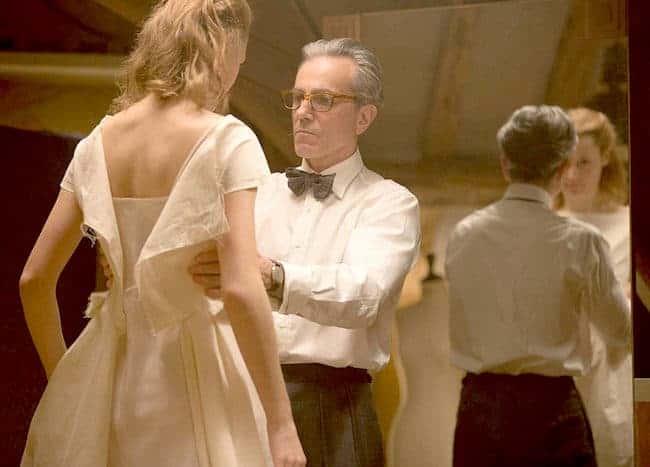
The only reading of this film that provides some possible gravitas to this latest collaboration between Daniel Day Lewis and director Paul Thomas Anderson (who directed Lewis to an Oscar in an equally perplexing film, There Will Be Blood) is one provided to me by a brilliant friend/cultural theorist in San Diego. She reads this film as a text on class confrontation. Alma represents the oppressed working class who finds a clever way to keep her elite lover/employer under her control. Perhaps. But for me, even that tantalizing analysis doesn’t make Phantom Thread into an engaging cinematic artwork.
My other caveat concerns the acting. Even though it sounds sacriligeous, Daniel Day Lewis is not at his best in this, his allegedly final film before he retires from the screen. He appears bored with the work, and scenes in which he and Krieps (who has the most glowing skin surface in cinema) are called upon to argue, fight, and confront each other appear to have been improvised. You can actually watch the two actors fumbling for adequate words of rage. They fail, and the scenes remain unconvincing.
The Best
I’ve got my money on Lady Bird, a tale that’s been told many times before—young girl coming of age, acting out, hates her hometown, feels her parents don’t understand her, wants to head for New york—but rarely this well. So spot on is the writing, directing, and acting that the actors on the screen are all but transparent. They stand back and let the characters reveal themselves. Seamless production in which we are convinced that we’re watching real people in real situations—situations that we’ve all been in: sexual experimentation that is anything but romantic or thrilling; falling for Mr. Wrong; slogging away at pointless jobs in a city far from anywhere; loving our friends more than our siblings; ditching our Real Best Friend for the school’s most popular girl only to find out that she’s a complete loser and our Real Best Friend is the Real Thing.
So good. Just incredibly right on. Dad played by Tracy Letts is the good cop, and mom, the incredibly Laurie Metcalf is the bad cop, in fact mom is the center of Lady Bird’s world, for better or worse.
If there’s any justice in this world—and we all know just how big an “if” that really is—the Oscar for Best Supporting Actress would go to Laurie Metcalf as the edgy, loving, stressed out, picky, nagging, perpetually disappointed mother. A great parent riddled with flaws, worry, and compassion.
Saoirse Ronan as Lady Bird McPherson is the essence of 18-year-old longing, intelligence, and spunk. Lucas Hedges, who made a huge impression in Manchester by the Sea, plays her first boyfriend, then friend, and Timothee Chalamet (Call Me by Your Name) plays a petulant Mr. Wrong, with a sparkling Beanie Feldstein as Lady Bird’s BFF.
The agony and the joy of being young is perfectly etched by director Greta Gerwig, and just possibly SHE will take the Oscar for Best Director.






 Strawberry bavarian cream, with small ornaments of sorrel cream and nasturtium ice cream. Note the very tiny nasturtium leaf decoration. Oh God. No course was too large, or too small. Every portion was worth eating, and worth having splurged for.
Strawberry bavarian cream, with small ornaments of sorrel cream and nasturtium ice cream. Note the very tiny nasturtium leaf decoration. Oh God. No course was too large, or too small. Every portion was worth eating, and worth having splurged for.





 Over dinner, they talk about the movies and movie stars they loved when they were young, romances lost, dreams destroyed.
Over dinner, they talk about the movies and movie stars they loved when they were young, romances lost, dreams destroyed.


 Daniel Breaker as Aaron Burr
Daniel Breaker as Aaron Burr









